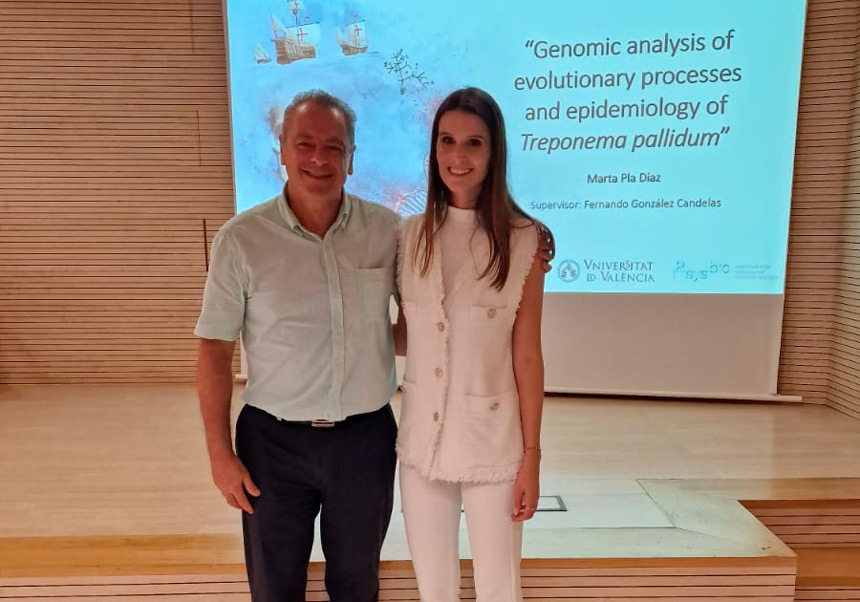Users
Social media
- More details here...
- Address
Parc Científic de la Universitat de València C/
Catedrático Agustín Escardino, 9
46980 Paterna (Valencia) Spain - Email:
iu.i2sysbio@uv.es - Phone:
(+34) 963544810
- Address
Links
Marta Pla-Diaz defends her thesis on the genomics and evolution of the pathogenic bacteria Treponema pallidum

Investigation & Education
Thesis
Marta Pla-Diaz defends her thesis on the genomics and evolution of the pathogenic bacteria Treponema pallidum

In this thesis, directed by Fernando González-Candelas, delves into the study of the bacteriaT. pallidum, which causes various diseases such as syphilis, thanks to the development of new genomic and evolutionary analysis techniques. Part of the results have been published in the journals Molecular Biology and Evolution, PLoS One and Current Biology. The thesis was defended on September 18, 2023.
Advances in sequencing technologies have increased the availability of complete genomes of Treponema pallidum, facilitating better knowledge of this bacteria that causes treponematosis, including syphilis. This doctoral thesis, entitled "Genomic analysis of evolutionary processes and epidemiology of Treponema pallidum", includes four studies on genomes, both ancient and contemporary, of T. pallidumto improve our understanding of its evolution and epidemiology. A new method has been developed for the detection of recombination in the genomes ofT. pallidumwhich improves previous tools for this essential component of bacterial phylogenomic analyses. Its application to 75 contemporary genomes ofT. pallidumrevealed 19 recombination events at 12 loci that have significantly contributed to the differentiation and current variability of theT lineage. pallidumcausing syphilis. Additional population genomic analyzes have revealed that the majority of these loci have a probable involvement in the defense and virulence of the pathogen. Until recently it was believed that it was not possible to obtain ancient genomes ofT. pallidum. In this thesis two almost complete ones have been obtained: one from Poland and dated to the 17th century, and the other from Brazil, from about 2000 years ago. This represents the first pre-Columbian genome ofT. pallidumoriginally from the Americas. The incorporation of these genomes into different data sets has made it possible to describe new recombination events. The identification of the strains involved indicates the coexistence and circulation of various subspecies in the same region. Furthermore, the data inferred on divergence between lineages by adding ancient genomes are prior to those obtained only with modern genomes, increasing the precision of the evolutionary timeline through dating based on Bayesian methods with molecular clock. Finally, to increase knowledge about the molecular epidemiology of treponematoses, a scheme was designed from 121 genomes of the three subspecies ofT. pallidum. This scheme allows efficient discrimination between strains of the three subspecies, revealing their genetic diversity and the prevalence of resistance to macrolide antibiotics. Analysis of genetic diversity and population structure reveals localized transmission patterns and highlights the influence of regional factors on the dispersal ofT. pallidum. Taken together, this thesis represents a significant advance in our understanding of the evolution, genomics, and epidemiology ofT. pallidum.
Marta Pla-Diaz carried out her doctoral research in the Molecular Epidemiology group under the supervision of Fernando González-Candelas, professor of genetics at the University of Valencia and researcher at the Institute of Integrative Systems Biology I2SysBio (UV-CSIC) and in the mixed unit of epidemiology and health (Fisabio-UV). During the development of the thesis, Marta Pla-Diaz spent a stay in the laboratory of Verena Schuenemann (University of Zurich) and enjoyed a contract from the University Teacher Training program (FPU). The qualifying panel was made up of Carmen Amaro (UV), Julio Rozas (Universitat de Barcelona) and Laura Gómez-Valero (Institut Pasteur, Paris), who rated the thesis as excellent.


